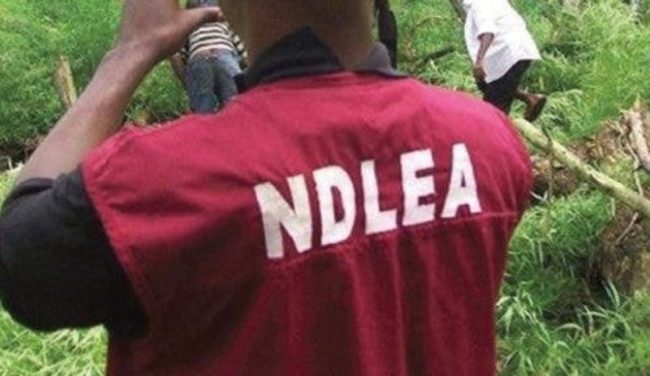WHILE the National Drug Law Enforcement Agency must be lauded for its success in arresting and exposing drug peddlers, the need to sustain the war against the drugs trade should not be lost to its triumphs. The NDLEA should not rest until it dismantles the drug trade outright.
In its drive to rid the country of the menace, NDLEA operatives seized 44,948 kilogrammes of illicit drugs in multiple raids across Lagos, Edo, and Ondo states in March alone. The anti-narcotics agency arrested eight suspects and 11 vehicles owned by drug cartels.
According to its Director of Media and Advocacy, Femi Babafemi, 14,311kg of psychoactive substances were razed on 5.7 hectares of farms in Ovia South-West Local Government Area, Edo State on March 19. Likewise, over 6,500kg of cannabis was destroyed in Edo on March 21. Also, 5,000kg of the same substance was razed in Owan West LGA by NDLEA and military troops on March 22.
In Ondo, 7,687.8kg of cannabis was destroyed in Akure, and another 670kg evacuated on March 23.
In Lagos, the agency seized 10,534kg of Ghanaian Loud, a strain of cannabis in the Ajah area of the state, where 11 vehicles were seized from the drug cartel on March 20. In another raid in the Ago Palace Way area of the state, a suspect was arrested with 1,006 ampoules of pentazocine injection; 50 tablets of tramadol 225mg; 89 bottles of codeine syrup, and 2,360 ampoules of Diazepam injection on March 22.
Huge seizures of drugs, vehicles, and arrests were also recorded in Ogun, Kaduna, Yobe, Kano, Abuja, and Nasarawa between March 18 and 27.
Indeed, the alarming frequency and quantum of arrests and seizures show that the drugs trade is entrenched in Nigeria.
Rightly, the NDLEA Chairman, Buba Marwa, recently urged the National Assembly to amend the NDLEA Act. Parliament must give utmost support to the agency by enacting stiffer laws against the possession, use, and distribution of illicit substances in the country. It is a war that must be won at all costs because of its far-reaching implications.
Evidently, the nexus between drug use and terrorism, banditry, and criminality has been established by the discovery of illicit substances in the camps of these criminals by the military. With their sophisticated arms, the hoodlums boldly wreak havoc on Nigeria.
Experts state that drug abuse bears negative consequences on families, friends, and businesses. Its health implications are dire. A public health review stated that apart from ill health and early death, drug users are more likely to battle with Hepatitis B and HIV/AIDS. Drugs stir countercultural activities like rape, cult, violence, armed robbery, and prostitution.
Nigeria’s drug abuse prevalence is worrisome. As of 2022, the Federal Government stated that drug use in the country was 14.4 per cent, while the United Nations Office on Drugs and Crime says prevalence in the country stands nearer to 15 per cent — almost three times higher than the global average.
Thus, Nigeria might become a narco-state. In Africa, Guinea-Bissau, which the Global Initiative against Transnational Organised Crime described as having “high crime rates, porous borders, chronically unstable politics, weak institutions and easily ‘bribable’ officials,” is one such entity.
The government must fight against state capture by barons before it is plagued by their subversive actions as seen in Colombia and Mexico. The NDLEA must collaborate with other security agencies to monitor the land borders, seaports and airports.
The motivation for the drugs trade is its lucrative nature. According to the Worldometer, total spending on illicit drugs worldwide stands at nearly $400 billion annually.
The NDLEA must give a special focus to drug barons. It must go beyond apprehending the minions and outright seizures of their bounty, to deepening its investigations to uncover financiers, hubs, and factories, thereby putting an end to their activities.

